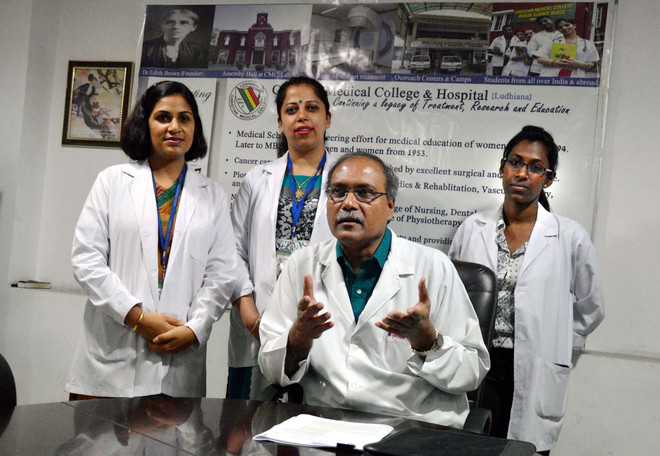
The national lead principal investigator for the study on brain stroke, Prof Jeyaraj D Pandian, addresses mediapersons in Ludhiana on Thursday. Photo: Inderjeet verma
Tribune News Service
Ludhiana, June 29
Stroke or brain attack is the leading cause of death and disability in the world. After medical treatment, patients need rehabilitation. In India due to lack of therapists (physiotherapists, speech and occupational therapists) patients do not receive rehabilitation adequately. Relatives carry out some rehabilitation at home.
However, whether this form of rehabilitation is effective or not has not been scientifically studied. Hence family members were trained to carry out rehabilitation at home in the recently concluded ATTEND trial. It was one of the largest stroke rehabilitation trials ever undertaken. It revealed that family-led rehabilitation was ineffective.
According to the research published in the medical journal “Lancet” this week there was no reduction in disability for patients on the trial, compared to those, who received no extra care.
Prof Jeyaraj D Pandian, the lead Investigator from India, who is head of neurology at Christian Medical College, said, “We found that despite extensive training in hospital and during follow up visits in homes, there was no difference in the degree of recovery or quality of life of people, who received this extra treatment.” He said, “We are confident that training sessions were completed correctly, and patients and care takers accepted the training. Our results suggest that effective rehabilitation may need to be provided by professionals, who have undergone years of training and are specialists in their own field.”
The George Institute researchers along with international and Indian stroke experts followed 1,250 patients from 14 stroke centres over six months in India. Stroke affects much younger working age people in India than those in high-income countries (an average of 15 years younger).
Half were provided access to professionals, including physiotherapists, who taught family techniques such as mobility training and communication practice. Each patient was also visited at his/her home to ensure that rehabilitation was carried out correctly by their care taker.
Dr Pandian added that, “In many parts of the world, people who have a stroke, receive little to no medical treatment at all. In India, there are only 35 stroke units across the whole country, and most are in the cities. In response to the rising rates of stroke there needs to be much greater investment in facilities for people affected by stroke.”
He said it was that hoped the family led care – also known as task shifting (the training of non-physician healthcare workers to perform tasks traditionally undertaken by physicians) – would help address the limited healthcare access for those with stroke in low and middle income countries. The disappointing results of the trial provides evidence that task shifting rehabilitation may not be effective.
Dr Dorcas Gandhi, Dr Cynthia Felix, Dr Shweta Jain and Mr Alim were the national coordinators of the trial.
Participants of the ATTEND trial
- The centres, which participated in ATTEND trial in India, are Christian Medical College, Ludhiana; PGIMER, Chandigarh (Dr Dheeraj Khurana); St Stephen’s Hospital, New Delhi (Dr Suresh Babu); AIIMS, New Delhi (Dr V Padma); Apollo Gleneagles Hospital, Kolkata (Dr Jayanta Roy); Guwahati Neurological Research Centre, Guwahati (Dr NC Borah); Baptist Hospital, Tezpur (Dr Lydia John); NIMS, Hyderabad (Dr Subash Kaul); Lalitha Superspeciality Hospital, Guntur (Dr P Vijaya); Christian Medical College, Vellore (Dr Sanjith Aaron); Global Hospital, Chennai (Dr Halprashanth); BGS Global Hospitals, Bangalore (Dr Madhusudhanan); AIMS, Kochi (Dr V Nambiar) and SCTIMST, Trivandrum (Dr PN Sylaja).
- The ATTEND trial is an international collaboration involving Christian Medical College, Ludhiana (National Coordinating Centre); The George Institute for Global Health, Sydney and Hyderabad; Universities of Nottingham, Leeds and Glasgow in the UK; Indian Institute of Public Health, Hyderabad.
- The project was funded by the National Health and Medical Research Council of Australia.
Stroke facts
- Out of the 17 million people, who suffer from a stroke each year, nearly 2 million cases are reported in India.
- The incidence of stroke are rising in low and middle-income countries (like India and China).
- The increase in stroke-related cases is due to the reduction of infectious diseases, rising living standards and the soaring of chronic ailments.
- Stroke affects younger people in India as compared to those in high income countries including Australia, the United States or the United Kingdom.



























